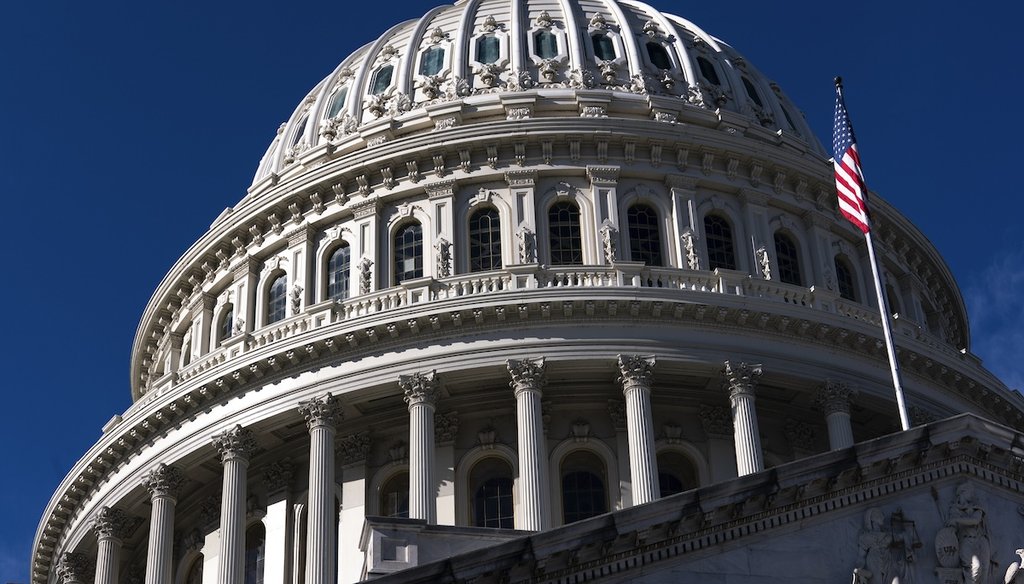Stand up for the facts!
Our only agenda is to publish the truth so you can be an informed participant in democracy.
We need your help.
I would like to contribute

(AP)
Is the current Congress the least productive of our lifetime? So far, yes
If Your Time is short
-
The current Congress has enacted half as many bills through March 26 as any previous Congress did through that date going back to 1989.
-
A longer look at the data shows that for low productivity in enacted bills, the 118th’s only competition would go back to at least the Civil War era.
From fruitless speaker votes to recurring threats of government shutdowns, the 118th Congress has had its share of challenges. But is it also the least productive Congress in history?
That’s what former Democratic National Committee Chair Donna Brazile said during a recent roundtable on ABC’s "This Week."
During a segment on March 24, former Rep. Ken Buck, R-Colo., said a flurry of impeachment efforts had hurt the current Congress’ credibility. The secretary of state, the defense secretary, the Joint Chiefs of Staff chairman, the attorney general, the FBI director, the homeland security director and the president had all been targets, he said.
Brazile thanked Buck for his congressional service and said the current Congress is "the least productive in our lifetime."
Brazile, who is 64, didn’t define "our lifetime," and the 118th session of Congress ends in January 2025.
Sign up for PolitiFact texts
But the historical data says she has a point.
The 118th Congress "is certainly on track to be the least productive in modern history," said Matthew Green, a Catholic University of America political scientist.
We asked Quorum, a public affairs software company, to crunch the official congressional data for us. It found that through March 26, the 118th Congress had enacted 42 bills, meaning that identical bills were passed by the House and Senate and then signed by the president. That was just 0.4% of the 11,877 bills introduced.
This is easily the smallest number through that date as far back as the 101st Congress, which met in 1989 and 1990.
The closest contender during that period was the 113th Congress, in 2013 and 2014, which enacted 86 bills — more than twice as many as the current Congress to date.
Data compiled by Southern Illinois University political scientist J. Tobin Grant and published by Georgetown University’s Government Affairs Institute found that the 112th Congress was "the least productive since the Civil War," referring to final numbers. That post was written before the 113th Congress was complete, and it turned out that the 113th Congress was even less productive than the 112th.
Since the 113th Congress was downright busy compared with the 118th, it’s safe to say there’s no one alive who has experienced a Congress that has enacted fewer laws than the current one. Although there’s time left for an unprecedented frenzy of lawmaking, presidential election years are notorious for fostering little bipartisan legislative cooperation.
One structural reason for the 118th Congress’ low legislative output is divided government. A Democrat holds the presidency, the Republicans hold the House (narrowly) and the Democrats hold the Senate (also narrowly).
From 1947 to 2015, there were six congresses in which Republicans held one chamber and Democrats held the other; Georgetown’s Government Affairs Institute found that these split congresses enacted 27% fewer laws than those with unified partisan control, regardless of which party controlled the White House.
Like the current Congress, the previous record-holder for the fewest laws enacted, the 113th, had a Democratic Senate and a Republican House.
John Frendreis, a political science professor emeritus at Loyola University Chicago, added another complicating factor for the 118th Congress: narrow margins. The Democrats have a 51-49 edge in the Senate, and most Senate legislation needs to clear a 60-vote procedural hurdle, giving the minority significant leverage.
In the House, the Republican majority has hovered in the low single digits, depending on vacancies.
Such a narrow margin "aggravates the normal tendency of divided government to make it more difficult to pass legislation," Frendreis said. "Without some negotiations, most things passed by the House on partisan votes are dead on arrival in the Senate."
The GOP’s slender edge in the House enabled a rebellious minority of the party to oust Speaker Kevin McCarthy, R-Calif., in October 2023. Besides causing chaos, this ouster cut into legislative time, forcing three weeks of failed votes to replace McCarthy.
Featured Fact-check
University of Utah political science professor James Curry said a productive Congress need not be synonymous with an effective Congress, since not all bills are of equal importance.
"Some laws are longer and some are shorter," Curry said. "Some do just one thing, while other laws are collections of dozens and dozens of separate policy proposals that at one point were separate bills, but were combined for enactment."
Steven Smith, an Arizona State University political scientist, said a better measure may be the number of pages enacted in public law.
"The number of pages per bill enacted has been large for some time," he said. "Simply moving appropriations from a dozen separate bills each year, 24 per Congress, to omnibus or minibus formats can radically affect the number of pages per bill enacted."
Joshua Huder, a senior fellow at Georgetown’s Government Affairs Institute, said that although some bills have broader reach than others, even with that caveat, "the takeaway is the same: On the whole, this Congress is historically unproductive."
Brazile expressed hope that the 118th Congress’ pace will accelerate.
"As a former Hill staffer, I follow the Congress more than the courts and the executive branches of government," she wrote PolitiFact in an email. "While they have moved on the budget and more, there’s still sufficient time to address some important issues before taking another long recess to celebrate the 4th of July and the upcoming party conventions."
Our ruling
Brazile said the current Congress is "the least productive in our lifetime."
It’s too early to know where the current Congress will end up in the number of laws enacted, as the session doesn’t end until January 2025. But through March 26, the 118th has passed half as many bills in about 15 months as any previous Congress did through that date going back to 1989.
A longer look at the data shows that someone would need to go back to at least the Civil War to find any competitor for enacting the fewest laws.
We rate this claim Mostly True.
Our Sources
ABC "This Week," transcript, March 24, 2024
Congressional data compiled for PolitiFact by Quorum
Axios, Capitol Hill stunner: 2023 led to fewest laws in decades, Dec. 18, 2023
Government Affairs Institute at Georgetown University, Our very unproductive Congress, accessed March 25, 2024
Rep. Nannette Baragan, D-Calif., X post, Nov. 15, 2023
NPR, 118th Congress to be the most unproductive in decades, Dec. 21, 2023.
New Republic, Republican congressman melts down asking what his party’s even doing, Nov. 13, 2023
C-SPAN, Rep. Chip Roy Criticizes GOP leadership over decision to pass continuing resolution as a suspension bill, Nov, 15 2023
Pew Research Center, Nothing lame about this lame duck: 116th Congress had busiest post-election session in recent history, Jan. 21, 2021
Quorum, How many bills were passed in 2021?, Feb. 25, 2022
The Associated Press, Speaker Mike Johnson faces threat of ouster from Republican Rep. Marjorie Taylor Greene, March 22, 2024
Email interview with James M. Curry, University of Utah political science professor, March 25, 2024
Email interview with John Frendreis, emeritus political science professor at Loyola University Chicago, March 26, 2024
Email interview with Matthew Green, Catholic University of America political scientist, March 27, 2024
Email interview with Steven Smith, Arizona State University political scientist, March 26, 2024
Email interview with Joshua Huder, senior fellow at Georgetown University's Government Affairs Institute, April 3, 2024
Email interview with Donna Brazile, Democratic strategist, April 2, 2024
Browse the Truth-O-Meter
More by Matthew Crowley
Is the current Congress the least productive of our lifetime? So far, yes
Support independent fact-checking.
Become a member!
In a world of wild talk and fake news, help us stand up for the facts.















































